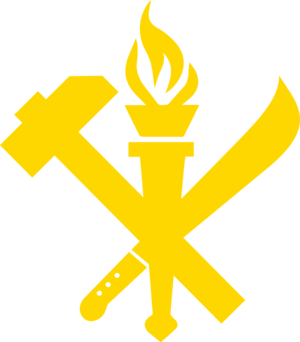Constitution of Asase Lewa
| Constitution of Asase Lewa | |
|---|---|
 | |
| Jurisdiction | |
| Ratified | 2 March 1969 |
| Date effective | 1 May 1969 |
| System | Federal council republic with party-state elements |
| Branches | Two (Workers' Councils and Judiciary) |
| Head of state | Presidium |
| Chambers | Unicameral (Supreme Workers' Council) |
| Executive | Presidium responsible to the Supreme Workers' Council |
| Judiciary | Constitutional Court Supreme Court Supreme Court of the Constituent Republics Provincial Courts Workers' Courts Comrades' Courts |
| Federalism | Federalism, alongside national personal autonomy for pygmies and other traditionally nomadic groups |
| Entrenchments | 17 |
| Location | People's Archives, Edudzi Agyeman City, Asase Lewa |
| Signatories | 309 members of the People's Constituent Assembly |
| Supersedes | Constitution of the Bahian People's Republic |
The Constitution of Asase Lewa is the supreme law of the Bahian Council Republic of Asase Lewa. The Constitution was drafted by the People's Constituent Assembly, an assembly formed as the result of negotiations between the Asalewan Section of the Workers' International and rebel mass organizations in the environment of the Protective-Corrective Revolution and comprised of representatives from the Section, the mass organizations, and embryonic, primarily rebel-dominated, elected Workers' Councils. After the Assembly convened in 1969 and finalized its constitutional draft in January 1969, the proposed Constitution was approved by referendum in March 1969. The successor to the 1953 Constitution of the Bahian People's Republic, the Constitution marks Asase Lewa's transition from a single-party state under the rule of the Asalewan Section to being a council republic, albeit one with constitutionally-entrenched powers in the part of the Section.
Since 1969, the Constitution has remained the supreme law of Asase Lewa, though having undergone notable amendments since then, primarily in the late 1970s and early 1980s; in the late 1970s, the Constitution was amended to grant national personal autonomy for pygmies and other members of traditionally nomadic groups, while in the early 1980s, negotiations between rebel-dominated urban workers' councils and the Asalewan Section in the wake of the Psychological-Technological Revolution, a self-coup by Asalewan Section General Secretary Kayode Temidare, led to substantial constitutional changes, notably the formalization of Kayode's actions through the doctrine of Perpetual-Cyclical Revolution, expanded checks by Workers' Councils on the Asalewan Section, and modest political liberalization by repealing provisions of the Constitution calling for family abolition and replacing state atheism with a doctrine of laïcité.
Called "in many ways, the quintessential councilist constitution" by Algirdas Jancius, a noted Valduvian scholar of Asalewan and Bahian politics, the Asalewan Constitution is notable for combining a strong assertion of constitutional supremacy rather than parliamentary sovereignty—as the Constitution was drafted by a constituent assembly, rather than a legislature, and imposes a strict constitutional framework in which legislative bodies can act—with an assertion in the right to resist and right of revolution, with the Constitution being one of the only ones in the world to provide an explicit legal framework for the end of itself and the state it represents, either through subsumption into a Pan-Bahian state or the state's withering away. The Constitution is also notable for an extensive number of entrenched clauses, both clauses enumerating unalienable rights and clauses establishing Asase Lewa's councilist political system and participatory economic system, with the aim of protecting the "proletarian, free, Bahian, and councilist" basic character of the state.